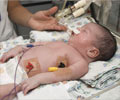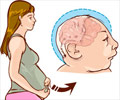Disorders in cell signalling pathways, vital for proper embryo development can lead to birth defects such as cleft palate, spina bifida.
Cell signaling pathways are particularly essential for proper embryo development and disorders in these cellular pathways can lead to birth defects such as cleft palate, spina bifida, reports a new study. The research is a collaborative effort of the University of Colorado, Health Sciences Center, and the Howard Hughes Medical Research Institute.
The findings of the research report, titled ‘p38 and a p38-Interacting Protein Are Critical for Downregulation of E-Cadherin During Mouse Gastrulation,’ will appear in the June 2 issue of the scientific journal Cell.Researchers from the University of Colorado School of Medicine at UCDHSC, the Howard Hughes Medical Institute, the Sloan-Kettering Institute, The Scripps Research Institute, and New York University School of Medicine's Skirball Institute of Biomolecular Medicine co-authored the report.
‘An important step in the regulation of cell movements is to loosen the binding of cells to one another,’ agreed Irene Zohn, PhD and Lee Niswander, PhD, lead authors of the report. ‘This transition is required to allow embryonic cells to move.’
Through their research, Niswander, Zohn and colleagues defined a functional pathway that regulates the transition of cells from non-motile to motile behaviors during very early development. Defects in the control of these early cell movements can result in problems in the formation of multiple organs during fetal development.











